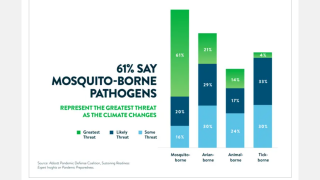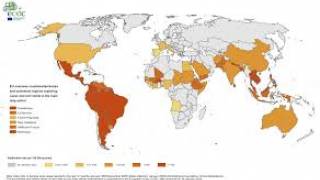Travel-Related Zika Cases Increased in the USA

According to the Pan American Health Organization, there have been 4,299 Zika virus cases confirmed in the Americas during 2019.
Furthermore, international travelers continue to contract the Zika while abroad and are bringing the virus home with them.
As of October 5, 2019, the states of California (28), Idaho (1), Nebraska (1), New Jersey (2), New York (2), Texas (1), and Utah (1) have reported travel-related Zika cases during 2019. says the US Centers for Disease Control and Prevention (CDC).
In California, the Department of Public Health reported the cities of Berkely (8) and Long Beach (12) confirmed the most cases.
The previous leader in reporting Zika cases during 2019, Florida, appears to have discontinued public reporting for 2019 on their Zika website and to to the CDC.
Meanwhile, the US Territory of Puerto Rico reported 5 additional Zika cases to the CDC during September. This new data increases Puerto Rico’s total to 39 cases, with 37 presumed local mosquito-borne transmissions during 2019.
A new study may have found a few reasons why Puerto Rico’s Zika virus outbreak has been so extensive.
This new study published on September 27, 2019, found less than 25 percent of 2,364 women surveyed in Puerto Rico reported consistent condom use during pregnancy in 2016.
The CDC continues to say ‘pregnant women and their male partners are advised to consistently and correctly use condoms when having intercourse or to abstain from intercourse during pregnancy to reduce the risk for sexual transmission of Zika virus.’
The good news from this CDC study shows healthcare provider counseling was associated with a 3-fold increase in condom use in Puerto Rico.
Furthermore, the recent PAHO report indicates which countries in the Americas are reporting locally-acquired Zika cases during 2019, and which are not disclosing information.
As of October 5, 2019, the PAHO reports the following:
- Brazil = 3,322
- Peru = 829
- Mexico = 50
- Bolivia = 27
- Columbia = 11
- Guatemala = 10
This PAHO data does not include any reporting from Cuba.
Previously, a July 2019 study found international travelers returning to Spain after visiting Cuba in 2017 were carrying the Zika virus.
While the Spanish travelers had visited different countries in Latin America and the Caribbean, the Zika cases were only identified in those who visited Cuba.
“These cases could reflect an absence of herd immunity in the Cuban population, as well as the possibility of it being one of the last places in the Americas with ongoing Zika virus transmission,” explains Alex Almuedo, M.D., first author of this study.
Additionally, Jose Muñoz, study coordinator, Head of the Tropical Medicine Service at the Hospital Clínic, said ‘these results underscore the need to consider possible Zika infection among travelers returning from Cuba.”
“It is also important to note that about 70 percent of the Cuba travelers that got infected with Zika did not seek advice before their trip,” adds Muñoz, highlighting that screening by travel clinics are “a key element to survey and prevent the introduction of these diseases in non-endemic regions.”
From a global perspective, a total of 87 countries and territories have confirmed evidence of autochthonous mosquito-borne transmission of the Zika virus to the World Health Organization, as of July 2, 2019.
As of October 4, 2019, Zika-related Travel Alerts have been issued by the CDC, the Canadian and the UK governments for various countries. As an example, reports indicate Zika in Thailand has become endemic.
To alert international travelers prior to planning a trip abroad, the CDC publishes a ‘map’ of countries reporting Zika cases.
Anyone who has not already been infected with the Zika virus can get it.
While many people with a Zika infection experience no symptoms, the virus poses potentially serious risks to unborn children, says the CDC.
A recent study found pregnant women who become infected with Zika early in pregnancy were 17 times more likely to deliver a baby suffering from a rare neurological condition called Microcephaly, and other negative health conditions.
Furthermore, since there is not a preventive vaccine available today, the CDC continues to recommend that pregnant women should not travel to areas with a Zika outbreak.
But, researchers around the world are trying to develop Zika vaccines using different development platforms. These Zika vaccine candidates include, but are not limited to, the following list:
These Zika vaccine candidates remain in clinical studies and will take more time before they become available to the public.
Vaccine news published by Zika News
Our Trust Standards: Medical Advisory Committee
























